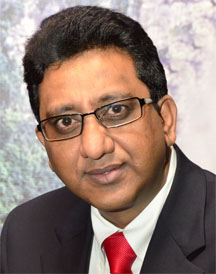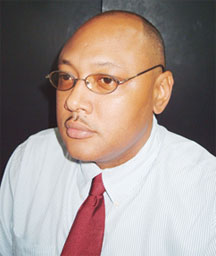-urges Trotman to act impartially
Attorney General Anil Nandlall is maintaining that the parliamentary opposition has no legal authority to prevent Minister of Home Affairs Clement Rohee from addressing the National Assembly, and he is urging House Speaker Raphael Trotman to ensure he acts impartially in handling the situation.
Nandlall’s comments were made during a television interview on the National Communications Network (NCN) with its editor Edward Layne and came ahead of today’s sitting of the National Assembly, where APNU and AFC are expected to pursue a motion to gag Rohee, in order to give effect to a motion of no confidence they had passed against him in July.

According to the Government Information Agency (GINA), Nandlall said the country’s constitution and the parliamentary standing orders compel Rohee to perform his functions as Minister, and his functions in the National Assembly. He added that there is nothing in law, and in the Constitution which would empower the Speaker of the House to prohibit Minister Rohee from speaking.
He referred to Trotman’s recent ruling on the effect of the no confidence motion on Rohee’s participation in the National Assembly, saying that in the absence of a substantive motion that sanctions the minister and directs that he be restrained from speaking, there were no legal grounds to retrain him from fulfilling his functions as minister in the House.
Nandlall said that the Speaker inexplicably advised the opposition to bring a substantive motion to gag Minister Rohee, although his ruling substantiated that the minister could not be prevented from participating in the National Assembly. “That I understand is what he is inviting them to do. But when you examine what his ruling says, you will find that he has placed himself in a conundrum from which it is impossible for him to extricate himself and that conundrum is this, he is saying, ‘I can find no provision within in the Standing Orders of the National Assembly, the Constitution and the laws of Guyana which restrains an elected member from fulfilling his functions’—he can find none—[and] he goes on to state again, ‘in the circumstances and having regard to the foregoing as Speaker of the National Assembly I have no power to restrict or deny the Hon. member Clement Rohee from speaking or in any way fulfilling his ministerial duties and responsibilities in so far as they relate to this House,’” he said.
According to GINA, Nandlall argued that since Trotman has said “unconditionally, unequivocally, unambiguously,” that he had no power to prevent Minister Rohee from speaking, the situation cannot be done away with through a substantive motion brought before the House.
“No Motion can change the Standing Order, the Constitution, the laws of the country; if the laws in their current formulation cannot invest you with the power, how can a motion invest you with the power?” he questioned.

“It’s a two-pronged argument: one you have no power in the first place; secondly, he has done no wrong within the precincts of the Assembly. All they are saying is that he is incompetent. For all you know, with the present construct of the law, it would appear as though a Member of Parliament or a Minister of the Government can be incompetent and not be removed in the National Assembly. The electorate has to remove him. The electorate has to remove the government or remove the member, not the National Assembly, they didn’t put him there,” he added. He also said that ministerial responsibility has no configuration in Guyana’s Constitution.
In this context, Nandlall was quoted by GINA as saying that a substantive motion to stop the minister from speaking will continue to be an impotent exercise. He added that both the Speaker and the Clerk could refuse to put the motion on the Order Paper, and even though the opposition can make an application for this motion to be heard using its majority, Trotman has the power to prevent it from happening.
Nandlall also charged that Trotman’s admitted discomfort with his own ruling was an “irreversible error,” saying that a Speaker is an impartial person even though he may be the consequence of a partial political process, like Trotman.
“When he assumes the Chair, aesthetical as it is, he is to unmask that political garb… he has to be an impartial adjudicator of the National Assembly… because he has to listen to arguments on both sides and rule, not because of political partisanship, but because of principles, because of the law, because of the Standing Orders, because of the Constitution, those are the guiding principles, not political affinity. Therefore it is incumbent and imperative that he remains politically aloof,” Nandlall was reported as saying.
The Attorney General added that the opposition’s reaction to Trotman’s ruling, including the move by members to use chanting to drown out Minister Rohee during his attempt at the second reading of a bill, was clearly an attempt at undermining his authority. “When those acts are committed, the presiding officer, the Speaker of the National Assembly has an inherent power to maintain order and to maintain decorum, rectitude, and maintaining the integrity of the tribunal, the law invests that Officer with the power to punish for contempt. There it is the joint opposition has displayed contempt in the face of the Parliament by defying the Speaker’s ruling the first thing, and then disregarding the Speaker’s order for them to restore order in the Assembly,” Nandlall said.
Minutes after Trotman adjourned the sitting under Standing Order 47, as a result of the actions of the opposition, the government had also charged that Trotman should have suspended the unruly members, adding that it was also provided for under the same Standing Order.
Trotman later dubbed this suggestion “absurd,” saying that had he done that, it would have been a “grave act of irresponsibility” on his part and one that would have promoted “serious tension.”








